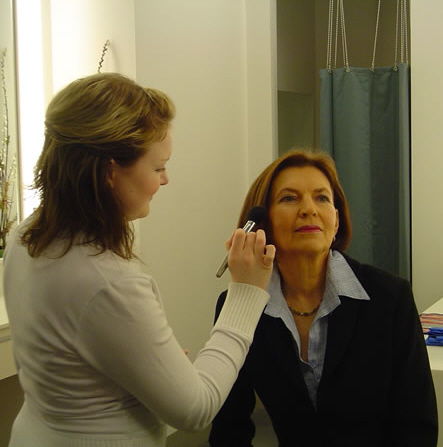
Fanny with make up artist Katie
Fanny Kiefer - CJOR 1978-88 (Rafe Mair was first
person interviewed on air); hosted last CJOR broadcast Sept. 2, 1988 before
change to classic rock CHRX; CKNW 1992-99; CBC-TV; host of Shaw Cable Studio
4
2001-current
***
Sept.
2/88: CJOR 600signs off after 62 years on the air with a farewell show hosted
by Fanny Kiefer. It’s personalities
during the last weeks as a talk format included Wayne Cox, Barrie Clarke, Fanny
Kiefer, Tom Mark, Al Davidson, Pat Burns Hot Line, Dan Russell’s Sportstalk,
Shell Busey’s Mr. Build Show, Michael Levi, Horse Talk with Tommy Wolski,
Bernice Gerard and Jamie Hart’s Heart Line.
CJOR signed off the air just before noon. At noon CHRX 600 brings “classic rock” back to the Vancouver
airwaves with a 90-hour commercial free music marathon. Its first song was Bob Seger’s “Ol’ Time
Rock n Roll.”.
***
Fanny Kiefer
Named one of the 25
most influential women in
the host of Studio
4 on Shaw TV. She began her award-winning career in broadcasting in
private radio,
public radio and television, and Internet broadcasting, interviewing a diverse
range
of guests in the
fields of arts, humanities, politics, entertainment and sports.
***
Lloyd Dykk
Flowers are all over the place in Shaw TV's Studio
4 and people keep coming up. "What a girl has to do to get some
attention," says the TV host Fanny Kiefer, adding,"a Mercedes would
be even better." She's talking about the massive cerebral aneurysm she had
about four months ago and from which she's completely recovered without even
having to rehabilitate, though half the people who suffer the severity of
Kiefer's attack are no longer among us to talk about it. Kiefer is very much
her old self, back to work as of last Tuesday and with no mental or physical
damage --there isn't even a trace of a scalp incision to betray the titanium
plate over her frontal lobe. And she's as talkative and charming as ever. The
polite thing to say, and too many well-meaning people tend say it, is "How
are you?" (strong emphasis on the "are.") And if you ever hear
that "you're 'not a victim,' you're 'a survivor,'" you can be pretty
sure that you're a victim of political correctness -- a victimization that's
hard to survive in itself. But never mind -- Kiefer is just astounded to learn
that she has "so many friends." She was out for dinner with a few of
them at her pal Vicki Gabereau's house the night before it happened. Kiefer
drove home afterwards, had a good night's sleep and went to work. Then she went
to the gym and during a lat-pull heard an explosion in her head that she says
sounded like a gun going off. Then she noticed that people seemed smaller and
far away. Her trainer made her sit down, gave her an Advil and a soda and
finally drove her to a clinic whose resident doctor thought she probably had a
headache and advised her to go to emergency should things get worse. They got
much worse. That evening Kiefer's good friend Nancy Morrison, the B.C. Supreme
Court justice, telephoned for something and learned that Kiefer had an
extremely severe
headache, was throwing up and didn't want to talk.
That was was very strange and did not sound like Kiefer at all. Morrison called
back early the next morning and heard a voice that was all but unrecognizable. “